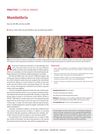Search
for
Sort by
Research
90-120 / 725 resultsresearch Alopecia and Associated Toxic Agents: A Systematic Review
Thallium, mercury, selenium, and colchicine strongly cause hair loss.
research Changes of Serum Trace Elements Level in Patients with Alopecia Areata: A Meta-Analysis
Low serum levels of zinc and selenium may increase the risk of alopecia areata.

research Paradise Nut Paradox: Alopecia Due to Selenosis from a Nutritional Therapy
Eating too many paradise nuts for cancer prevention caused a woman to lose all her hair due to selenium poisoning.

research What's New in the Histologic Evaluation of Alopecia and Hair-Related Disorders?
New biopsy techniques and tools improve alopecia diagnosis, and both too much and too little selenium can cause hair loss.
research Diffuse Alopecia and Thyroid Atrophy in Sheep
Low zinc and selenium levels in sheep are linked to hair loss and thyroid problems.

research Monilethrix
A three-year-old girl has hair loss despite treatment with selenium sulfide shampoo and anti-fungal medication.
research Clinical Signs and Laboratory Tests for the Differential Diagnosis of Androgenic and Post-COVID-19 Alopecia in Women
Post-COVID-19 hair loss is different from androgenetic alopecia and can be identified by lower copper and higher selenium levels.
research Dietary Patterns, Plasma and Hair Trace Element in Ukrainian Cohort of Adults During COVID-19 Pandemic: A Cross-Sectional Study
Good nutrition and essential trace elements like zinc, selenium, and iron are important for a strong immune system and reducing COVID-19 severity.

research Evaluation of Signs of Skin Aging in Patients with Metabolic Syndrome after Substitution Therapy with Antioxidants. Summary of the Doctoral Thesis
Antioxidant therapy, especially with selenium, can improve skin aging in patients with Metabolic Syndrome.
research Nutritional Skin Diseases in Goats
Some goats get rare skin diseases from not enough vitamin E, selenium, or zinc, but they're usually still healthy.
research Finding Evidence of the Efficacy and Safety of Selenium in Treating Hashimoto's Thyroiditis: A Systematic Literature Review
Selenium's effectiveness in treating Hashimoto's thyroiditis is inconclusive.

research The Role of Vitamins and Minerals in Hair Loss: A Review
Some vitamins and minerals like vitamin D and iron can help with certain types of hair loss, but more research is needed for others.
research Guidelines for the Management of Tinea Capitis in Children
Systemic treatment is necessary for tinea capitis in children, with griseofulvin preferred for Microsporum infections.

research Diet and Hair Loss: Effects of Nutrient Deficiency and Supplement Use
Correcting nutrient deficiencies may help with hair loss, but the benefits of supplements without a deficiency are uncertain and could be harmful.

research Nutrition and Hair Health: The Impact of Nutritional Deficiencies
Certain groups may need vitamin supplements to improve hair health and prevent other health problems.
research Micronutrient Status in Patients Receiving Home Parenteral Nutrition
One-third of patients on home nutrition had micronutrient deficiencies, with iron deficiency being most common, but serious issues were rare.
research Hair Toxic and Essential Trace Elements in Children with Autism Spectrum Disorder
Children with autism have lower levels of essential and toxic trace elements in their hair.

research The Role of Micronutrients in Alopecia Areata: A Review
People with alopecia areata often have lower levels of vitamin D, zinc, and folate, but more research is needed to understand if supplements can help treat it.

research Hair Loss in Psychopharmacology
Some psychiatric medications can cause hair loss, but it usually grows back after adjusting the medication.

research Adverse Cutaneous Reactions to Mood Stabilizers
Mood stabilizers can cause serious skin reactions; careful monitoring and immediate treatment are crucial.

research Annurca Apple Nutraceutical Formulation Enhances Keratin Expression in a Human Model of Skin and Promotes Hair Growth in a Randomized Clinical Trial
Annurca apple supplement safely increases hair growth and keratin in humans.
research Health Survey of Boreal Caribou (Rangifer Tarandus Caribou) in Northeastern British Columbia, Canada
Boreal caribou in northeastern British Columbia have significant health issues, including infections, tick infestations, and mineral deficiencies.

research Alopecia in Children: The Most Common Causes
The four main causes of hair loss in children are fungal infections, pulling out hair, autoimmune hair loss, and stress-related hair shedding.

research Expert Consensus on the Management of Telogen Effluvium in India
Indian dermatologists recommend treating common hair loss with a balanced diet, stress reduction, mild shampoos, and sometimes minoxidil and supplements.
research The Infected Hairs of Tinea Capitis Due to Microsporum Canis: Demonstration of Uniqueness of the Hair Cuticle by Scanning Electron Microscopy
The hair cuticle acts as a barrier against fungal infection, which occurs only deep within the hair follicle.

research Nutrition of Women with Hair Loss During Menopause
Eating a balanced diet with specific nutrients is important for menopausal women to manage hair loss.

research A Systematic Review on Topical Marketed Formulations, Natural Products, and Oral Supplements to Prevent Androgenic Alopecia
Various treatments, including FDA-approved drugs, natural products, and oral supplements, can help with hair loss, but a patient's medical history and potential allergies should be considered when choosing a treatment.

research Clinical Study to Evaluate the Efficacy and Safety of a Hair Serum Product in Healthy Adult Male and Female Volunteers with Hair Fall
The hair serum significantly improved hair growth and reduced hair fall without causing any skin issues.

research A Case of Acute Telogen Effluvium After SARS-CoV-2 Infection
COVID-19 may trigger sudden temporary hair loss.